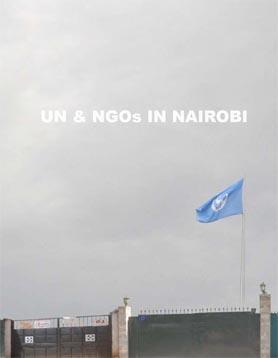UN & NGOs in Nairobi

Students: Vincent Bowman, Silvio Brunner
Location: Group work in Nairobi
Date: December, 2007
Type: Research project, student work, ‘Humanitarian Spaces’
Nairobi is one of the ‘capitals’ of the international community and international and local Non-Governmental Organisations (NGOs) world wide. Probably no other city hosts so many organizations that are operating within humanitarian agendas, such as relief work, slum upgrading, community services, schooling, employment, empowerment and emancipation, environmental preservation or refugee activities. The latest directory of NGOs in Eastern Africa lists no less than 850 organizations that are based in Nairobi. The presence of the UN in Nairobi was first established in 1964 and has expanded ever since. Today, Nairobi is the only city outside of the western world, which hosts headquarters to UN organisations such as UN-Habitat or UNEP. On the level of NGOs, the strong presence of a ‘humanitarian community’ can be traced back to the needs of the local population and the deficiencies existing on the ground. Apart from this classic condition that is often inscribed in a developmental agenda, Nairobi has become a main hub of NGOs because it is the capital of a country which has experienced relative stability and has a well developed infrastructure, surrounded by countries affected by wars, internal conflicts and general dire needs. While its eastern neighbor Somalia is maybe the most extreme example of a so-called ‘failed state’, Sudan, Uganda, Burundi, Rwanda and the Democratic Republic of Congo (DRC) have experienced long lasting conflicts and some of the most devastating tragedies of the last decades. Representing an island of stability, from which operations can be easily administered, many NGOs have established their base in the Kenyan capitol. The third main reason is the presence of the UN itself and its various suborganisations, which attracts many NGOs to Nairobi. Even if the relationships is often characterized by doubt and mistrust, the proximity often facilitates access to funds and resources that are of high value to the various NGOs.
Apart from all of their immediate activities and their areas of concern, the UN and NGOs have a direct impact on the city of Nairobi. First of all, they occupy a vast amount of physical space in the city. Their presence, and the location of their offices has an impact on the immediate surroundings, and the neighborhoods in which they are located in. They organize themselves in ‘NGO Interest Groups’, produce publications coordinating their presence, occupy distinct places of recreation and information in the city.
Download the Book PDF

